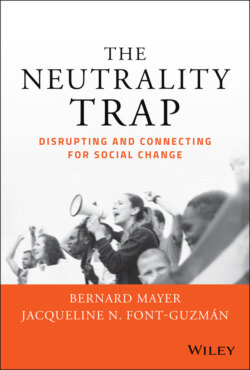Читать книгу The Neutrality Trap - Bernard S. Mayer - Страница 10
Strategic Disruption
ОглавлениеNo matter how dramatic the impetus from external sources, intentional efforts at disruption through popular movements and political activism are essential to forcing change and guiding how it occurs. Without intentionality and a conscious change strategy, our capacity to foster system reconstruction (and, in some cases, system destruction) is limited and haphazard. Each of us has a role to play in this, and we each have a unique set of capacities that we can bring to this process. In order to do so, we have to recognize this potential individually and collectively and find the moral courage to pursue it.
One place to start is by recognizing how often, despite our best intentions, especially when we occupy positions of privilege, we are part of the problem. Much of what we do, including much of the good work we undertake, contributes to the maintenance of systems that we want to change. This is inevitable because we are part of these systems. Our natural desire to believe that we are good people doing good things can lead us to downplay our role in maintaining the structures of oppression and hierarchy.
This paradox—that the good work we do often reinforces destructive systems—can be found in what conflict interveners do to guide disputes toward resolution, but the same is true for all “service professions,” including medicine, counseling, law, human services, and education.
For example:
When we participate in collaborative efforts to deal with organizational conflict, we may be enabling the continuance of an exploitative hierarchy.
When we foster dialogue between community members and police officers to try to improve relationships and communication, we may be reinforcing a public safety model that emphasizes law enforcement over community development and mental health.
When we convene conversations among different ethnic groups to try to resolve tensions that have led to violent interchanges, we may undercut a growing movement to promote the rights of a historically exploited group.
None of these efforts are necessarily misguided or inappropriate. As we seek to change systems, we also have to support people as they navigate these systems. But undertaking them without considering the impact our well‐intentioned and even necessary actions may play in the larger pattern of dominance, oppression, or hierarchy is problematic and sometimes dangerous. One of the most important challenges we face in promoting social change is how to develop strategies for increasing constructive dialogue among groups in conflict while also raising the level of that conflict in an effective and durable way.
